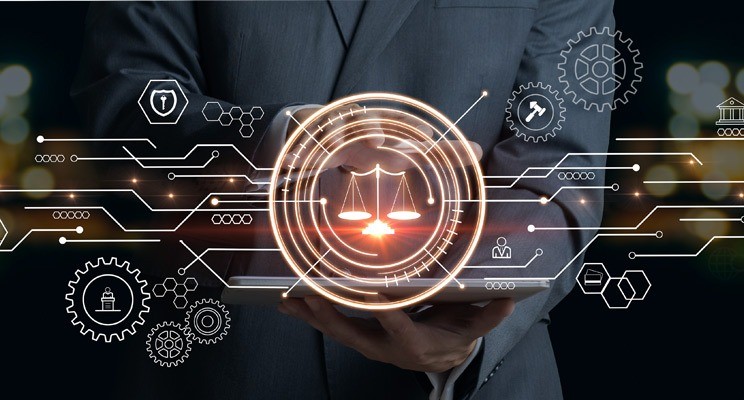The legal profession has long been seen as a traditional field, full of paperwork, face-to-face meetings, and lengthy court processes. However, in recent years, technology has begun to reshape how legal professionals work, bringing new tools and systems that make legal services more efficient, affordable, and accessible. From artificial intelligence (AI) helping with legal research to online platforms for dispute resolution, technology is transforming the legal landscape in significant ways.
1. Faster Legal Research with AI
Legal research has always been one of the most time-consuming tasks for lawyers. Sifting through case laws, statutes, and precedents used to require long hours of manual searching. With AI-based tools, this process has become faster and more accurate.
In India, platforms like NearLaw and CaseMine are revolutionizing legal research. These platforms use artificial intelligence to search through vast legal databases in a matter of seconds. Lawyers can now find the most relevant cases, statutes, and rulings with the help of these tools. They can also use AI to detect patterns in case law, helping predict how a judge may rule in a particular matter. These tools not only save time but also increase the accuracy of legal research, providing a competitive advantage to legal practitioners.
2. Automating Document Creation
Legal professionals handle a vast amount of paperwork, including contracts, agreements, and legal briefs. Drafting these documents manually can be repetitive and error-prone, but automation tools are helping streamline this process.
In India, tools like LegitQuest and DraftSpotter assist in document automation. By using templates and customizable forms, lawyers can quickly create documents without starting from scratch every time. For example, when drafting a standard contract like a non-disclosure agreement (NDA), a lawyer can use a pre-built template and insert case-specific details. This reduces the risk of errors and allows lawyers to focus on more substantive issues. Automation tools are particularly helpful for smaller law firms and independent lawyers who need to increase their efficiency.
3. Managing Data with E-Discovery Tools
With the rise of digital communication, legal cases often involve huge amounts of data—emails, text messages, social media posts, and more. Finding relevant information in this data is a daunting task, but e-discovery tools make this process much easier.
Indian legal tech platforms such as LegalMind and NextGenDiscovery are assisting lawyers in sorting through large datasets quickly and efficiently. These platforms can analyze vast amounts of data, automatically identify key documents, and highlight important sections. They also help lawyers stay compliant with legal regulations related to data privacy and information security. E-discovery tools are crucial in complex legal cases involving corporate litigation, intellectual property disputes, and other areas where large amounts of digital data are involved.
4. Remote Work and Virtual Law Firms
The COVID-19 pandemic has forced many legal professionals to rethink how they work. Remote working tools have become essential, allowing lawyers to manage cases, communicate with clients, and even conduct hearings from home.
In India, platforms like PracticeLeague and LawGro offer cloud-based practice management solutions, enabling lawyers to manage their work remotely. These tools allow case tracking, client management, timekeeping, and secure document storage—all through the cloud. Virtual law firms have also gained popularity, providing more flexible work arrangements for lawyers and more affordable services for clients. Video conferencing tools like Zoom and Google Meet have become standard for client meetings, mediations, and even court appearances.
5. Online Dispute Resolution (ODR)
Traditionally, resolving legal disputes involved physical court hearings or in-person mediation. However, Online Dispute Resolution (ODR) is becoming an increasingly popular way to handle disputes digitally.
In India, platforms like Presolv360 and SAMA are leading the way in ODR. These platforms allow disputing parties to resolve issues entirely online, without the need for lengthy courtroom battles. This is particularly useful for small claims, consumer disputes, or conflicts where the parties are geographically distant. ODR offers a faster, more affordable, and convenient alternative to traditional litigation, helping alleviate the burden on India’s overworked court system.
Become a judge with us Read More 6. Smart Contracts and Blockchain Technology
Blockchain technology is primarily known for cryptocurrencies like Bitcoin, but its potential in the legal field is rapidly growing, especially in the area of smart contracts. Smart contracts are self-executing agreements where the terms of the contract are coded into a blockchain. When the agreed conditions are met, the contract automatically enforces itself without the need for intermediaries.
In India, blockchain technology is still in its early stages, but legal tech startups like Somish Blockchain Labs are exploring its potential in areas such as contract law, property transactions, and intellectual property rights. A smart contract could, for instance, automatically transfer ownership of a property when a payment is made, speeding up real estate transactions and eliminating the need for third-party verification. Blockchain technology has the potential to revolutionize not only contract law but also other legal fields by making transactions more transparent, secure, and efficient.
7. Legal Tech Startups and Innovation
India has seen a surge in legal tech startups in recent years, offering innovative solutions to make the legal profession more efficient and accessible. These startups are leveraging emerging technologies such as AI, blockchain, and data analytics to address common challenges faced by legal practitioners.
Platforms like SpotDraft and LawSikho are good examples of how legal tech is evolving. SpotDraft uses AI to help businesses and law firms automate contract management, review legal documents, and flag issues, making legal services more affordable and accessible. LawSikho, on the other hand, offers online legal education and skill development programs, democratizing access to high-quality legal training across India.
These startups are playing a critical role in making legal services more accessible, especially for small businesses and individuals who may not have the resources to hire expensive legal services.
8. Challenges and Ethical Considerations
While technology offers numerous benefits to the legal profession, it also raises ethical and legal challenges. For example, when AI is used to provide legal advice or create documents, who is responsible if the advice is incorrect or incomplete? Legal professionals must ensure that they use these tools in a manner that upholds ethical standards and client confidentiality.
Data security is another significant concern. Legal professionals handle sensitive information, and with the increasing shift to cloud-based platforms and digital tools, the risk of data breaches is higher. Indian law firms must ensure compliance with data protection laws like the Information Technology (IT) Act and global regulations like the General Data Protection Regulation (GDPR).
Conclusion: The Future of Legal Practice
The role of technology in the legal profession is expanding rapidly. From AI-powered research tools and blockchain-enabled contracts to virtual law firms and ODR platforms, technology is making the legal profession more efficient, accessible, and transparent.
For Indian lawyers and law firms, adopting these technological tools is no longer optional—it is a necessity to stay competitive in an increasingly digital world.



